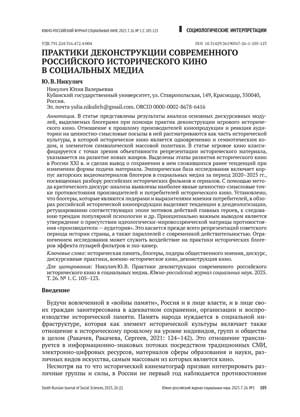Abstract
The article presents the findings of an analysis of the primary discursive modules emphasized by bloggers through the practice of deconstructing historical fiction cinema. The attitude of film producers towards the past, as well as the audience’s reaction to the value and meaning messages in it, are considered to be part of historical culture. In this context, historical cinema is regarded as both a semiotic code and an element of symbolic mass politics. The article categorizes feature films according to the objectivity of their representation of historical material, and it identifies the emergence of novel genres. The evolution of historical cinema in Russia during the 21st century has been delineated, and it has been determined that the medium has maintained the established trends while undergoing a transformation in its mode of presentation. The empirical basis of the study is a corpus of videos created by bloggers in social media for the years 2020–2025. This corpus is dedicated to the analysis of Russian historical films and TV series. The most obvious value and semantic points of confrontation between producers and consumers of historical cinema have been identified by means of critical discourse analysis (N. Fairclough). Recent research has indicated that bloggers who function as leaders and spokespeople for consumer opinion in reviews of Russian historical film productions highlight several trends. Firstly, there is a tendency for de-ideologization. Secondly, there is a retouching of the motives of the main characters’ actions to make them appropriate to the epoch. Thirdly, there is a tendency to follow trends in popular psychology. A conclusion of paramount importance is the observation concerning the existence of an ideological framework of confrontation ‘producer — audience’. This concerns, first of all, representations of the Soviet period of the country’s history, as well as parallels with contemporary reality. A potential shortcoming of the study is might be the failure to address the impact of filter bubbles and echo chamber effects on the practices of historical bloggers.
Keywords
References
Ассман, А. (2014). Рефреймируя память. Между индивидуальными и коллективными формами конструирования прошлого. Гефтер. Режим доступа https://gefter.ru/archive/11839
Ассман, Я. (2004). Культурная память: Письмо, память о прошлом и политическая идентичность в высоких культурах древности. Москва: Языки славянской культуры.
Бурдье, П. (1977). О символической власти. Гуманитарный портал. Режим доступа https://gtmarket.ru/library/articles/3052
Волков, Е.В., Пономарева, Е.В. (2012). Игровое кино как исторический источник. Вестник Южно-Уральского гос. университета. Сер. «Социально-гуманитарные науки», 10(269), 22–26.
Дубровин, В.Л. (2024). Художественно-игровой контент как инструмент «мягкой силы» в условиях гибридной войны против российского общества. Знание. Понимание. Умение, 1, 210–224. DOI: 10.17805/zpu.2024.1.16
Жабский, М.И., Тарасов, К.И. (2024). Разноликое качество кинофильма. Вестник ВГИК, 16.2(60), 147–155.
Ильин, И.П. (2001). Постмодернизм. Словарь терминов. Москва: ИНИОН РАН — Intrada.
Исаев, Е. (2021). Кинематограф. В А. Завадский, В. Дубина (ред.). Всё в прошлом. Теория и практика публичной истории (с. 267–284). Москва: Новое издательство.
Карасик, В.И. (2023). Языковое преобразование реальности. Москва: Государственный институт русского языка им. А.С. Пушкина.
Карпухин, О.И., Комиссаров, С.Н. (2024). Что творят творцы? Художественная интеллигенция в условиях гибридной войны. Гуманитарий Юга России, 6(13), 245–261. DOI: 10.18522/2227-8656.2024.6.19
Колесникова, С.М., Колесникова В.В. (2024). Роль кинематографии в формировании культурной идентичности: история, традиции и ценности. Ученые записки НовГУ, 3(54), 420–430. DOI: 10.34680/2411-7951.2024.3(54).420-430
Лотман, Ю.М. (1973). Семиотика кино и проблемы киноэстетики. Таллин: Ээсти Раамат.
Лотман, Ю.М. (2000). Семиосфера. С.‑Петербург: «Искусство — СПБ».
Малинова, О.Ю. (2019). Политика памяти как область символической политики. В М.В. Ильин (ред.) МЕТОД: Московский ежегодник трудов из обществоведческих дисциплин: сборник научных трудов. Вып. 9: Методологические аспекты трансдисциплинарного трансфера знаний (с. 285–312). Москва: ИНИОН РАН. Режим доступа https://inion.ru/site/assets/files/4892/metod_2019–9.pdf
Малинова, О.Ю., Джонсон, Дж. (2020). Символическая политика как предмет political science и Russian studies: исследования политического использования прошлого в постсоветской России. Политическая наука, 2, 15–41. DOI: 10.31249/poln/2020.02.01
Миллер, А.И. (2015). Политика памяти в России: роль экспертных сообществ. Символическая политика, 3, 210–234.
Никулич, Ю.В. (2023). Рискогенность публичной истории в цифровой среде (на примере российского видеоблогинга 2020‑х гг.). Цифровая социология, 6(3), 11–20. DOI: 10.53598 / 2410-3691-2022-4-309-113-120
Поцелуев, С.П. (1999). Символическая политика: констелляция понятий для подхода к проблеме. Политические исследования, 5, 62–75.
Ракачев, В.Н., Ракачева, Я.В., Сергеев, В.Н. (2021). Историческая культура: к вопросу теоретического осмысления феномена в зарубежной и отечественной науке. Южно-российский журнал социальных наук, 22(2), 124–142.
Ромашин, М.И. (2024). Военный фильм/сериал в пространстве исторической памяти. Человек и культура, 4, 132–144. DOI: 10.25136/2409-8744.2024.4.43840
Ферро, М. (1992). Кино и история. Вопросы истории, 2, 47–57.
Фуко, М. (2004). Археология знания. Санкт-Петербург: Гуманитарная академия.
Хальбвакс, М. (2007). Социальные рамки памяти. Москва: Новое издательство.
Штейн, С.Ю. (2024). Киноведение и профессиональное кинематографическое образование. Артикульт, 4(56), 19–27. DOI: 10.28995/2227-6165-2024-4-19-27
Begby, E. (2022). From Belief Polarization to Echo Chambers: A Rationalizing Account. Episteme, 14, 1–21. DOI: 10.1017/epi.2022.14
Berger, P., Luckmann, T. (1967). The Social Construction of Reality. Treatise in the Sociology of Knowledge. New York: Penguin Books.
Einav, G. (2022). Bursting Filter Bubbles in a Digital Age: Opening Minds and Reducing Opinion Polarization through Digital Platforms. Technology in Society, 71. DOI: 10.1016/j.techsoc.2022.102136
Ekström, A.G. (2022). Self-imposed Filter Bubbles: Selective Attention and Exposure in Online Search. Computers in Human Behavior Reports, 7. DOI: 10.1016/j.chbr.2022.100226
Fairclough, N. (1995). Critical Discourse Analysis. London: Longman.
Hohmann, M. (2023). Quantifying Ideological Polarization on a Network using Generalized Euclidean Distance. Science Advances, 9(9). DOI: 10.1126/sciadv.abq2044
Meyer, T. (1992). Inszenierung des Scheins.Voraussetzungen und Folgen symbolischer Politik. Frankfurt am Main: Suhrkamp.
Rosenstone, R.A. (1995). Visions of the Past: The Challenge of Film to Our Idea of History. Cambridge: Harvard University Press.
Scheibenzuber, C. (2023). Dialog in the Echo Chamber: Fake News Framing Predicts Emotion, Argumentation and Dialogic Social Knowledge Building in Subsequent Online Discussions. Computers in Human Behavior, 140(1). DOI: 10.1016/j.chb.2022.107587
Smith, P. (Ed.) (1976). The Historian and Film. Cambridge: Cambridge University Press.


